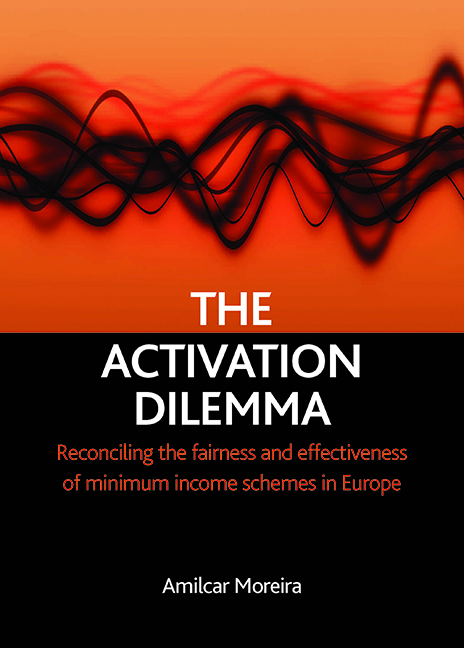 The Activation Dilemma
The Activation Dilemma Book contents
- Frontmatter
- Dedication
- Contents
- List of tables and figures
- List of abbreviations
- Acknowledgements
- one Introduction
- two The right to a minimum income: between Mead and Van Parijs
- three Justifying a minimum income guarantee: the right to personal development
- four The activation dilemma: a comparative study
- five Measuring respect for the right to personal development
- six The employment effectiveness of minimum income schemes
- seven The employment effectiveness of minimum income schemes and their respect for the right to personal development
- eight Conclusion
- Appendix A Methodology for benefit comparison
- Appendix B Unemployment reintegration capacity (URC): sensitivity analysis
- Appendix C Qualitative comparative analysis: laws of Boolean algebra
- References
- Index
- Also available from The Policy Press
seven - The employment effectiveness of minimum income schemes and their respect for the right to personal development
Published online by Cambridge University Press: 21 January 2022
- Frontmatter
- Dedication
- Contents
- List of tables and figures
- List of abbreviations
- Acknowledgements
- one Introduction
- two The right to a minimum income: between Mead and Van Parijs
- three Justifying a minimum income guarantee: the right to personal development
- four The activation dilemma: a comparative study
- five Measuring respect for the right to personal development
- six The employment effectiveness of minimum income schemes
- seven The employment effectiveness of minimum income schemes and their respect for the right to personal development
- eight Conclusion
- Appendix A Methodology for benefit comparison
- Appendix B Unemployment reintegration capacity (URC): sensitivity analysis
- Appendix C Qualitative comparative analysis: laws of Boolean algebra
- References
- Index
- Also available from The Policy Press
Summary
Having measured the schemes’ employment effectiveness and their respect for recipients’ right to personal development, this chapter now uses simple correlational tools, QCA and cluster analysis to test the hypothesis that minimum income schemes that show more respect for the right to personal development, once labour market conditions are accounted for, will present higher levels of employment effectiveness.
Correlational analysis
As can be seen from Table 7.1, there is no systematic relationship between a scheme's respect for the right to personal development and their marginal employment effectiveness. Therefore we cannot corroborate the hypothesis posed earlier. This reflects the variety of situations found in the sample under analysis. For instance, the ABW in the Netherlands, which shows the highest respect for the right to personal development, presents negative marginal employment effectiveness. At the same time, the RMI in France and RMG in Portugal, which show the least respect for recipients’ right to personal development, also display negative marginal effectiveness. On the other hand, the SB in Denmark, after the introduction of the new Act of Active Social Policy, is able to combine positive marginal employment effectiveness with a greater respect for recipients’ right to personal development.
Table 7.1 also suggests that improving the satisfaction of the recipients’ income needs and reducing the level of discretion they are subjected to can have a positive impact on the schemes’ marginal employment effectiveness. On the other hand, increasing recipients’ freedom to choose the job they want and, in particular, the type of activities they would like to perform, would have the opposite effect. Curiously, the data suggest that increasing the restitutive character of the sanctions applicable to minimum income recipients will not have an impact on the schemes’ marginal employment effectiveness.
Finally, Table 7.1 shows that there is a positive correlation (r = 0.17) between the investment in training and education policies and the employment effectiveness of minimum income schemes. On the other hand, there is no correlation between the investment in job creation schemes and the schemes’ ability to return beneficiaries to the labour market. It should be noted, nonetheless, that there is a significant reduction in the impact of these variables on a scheme's employment effectiveness once labour market conditions are take into consideration.
- Type
- Chapter
- Information
- The Activation DilemmaReconciling the Fairness and Effectiveness of Minimum Income Schemes in Europe, pp. 97 - 114Publisher: Bristol University PressPrint publication year: 2008


